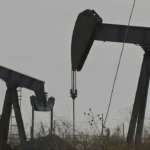Crude oil futures were stable during early trading in Europe today. A bullish factory report from China boosted positive sentiment for the worlds second oil consumer. However, prices could hardly go further upwards, after the US weekly inventories report lifted prices to what some analysts called “preposterous levels” yesterday. Elsewhere, Ukraine is preparing for the presidential election on May 25.
West Texas Intermediate futures for settlement in July traded for $103.86 per barrel at 6:55 GMT on the New York Mercantile Exchange, down 0.20%. Prices ranged from $103.67 to $104.11 per barrel. Yesterday the US benchmark rose by 1.70% as the EIA report revealed inventories, reaching a monthly high of $104.29 per barrel. So far this week the contract has gained 2.47% with its main support from dwindling stockpiles ahead of driving season.
Meanwhile on the ICE in London, Brent futures due in July recorded a 0.10% decline to trade for $110.44 per barrel at 6:48 GMT. Daily high and low stood at $110.61 and $110.40 per barrel, respectively. Brent’s premium to WTI stood at $6.58, widening Wednesdays closing margin of $6.48. Yesterday the European brand added 0.78%, reaching an 11-week high of $110.73 per barrel. So far this week, the contract hass price has increased by 0.72% with support from geopolitical developments in Europe and Africa, as well as US supplies.
US inventories
“I find $104 WTI a bit preposterous given how ample supplies are but I wouldn’t recommend standing in the way of this,” said for Bloomberg Stephen Schork, president of the Schork Group Inc. in Villanova, Pennsylvania. “There’s still ample crude.”
The weekly Energy Information Administration report on oil inventories in the US for the week ended May 16 was released yesterday. Crude oil supplies were shown to stand at 391.3 million barrels, recording a 7.226 million barrel decrease from last week, when stocks had grown by 947 000 barrels. On Tuesday the private American Petroleum Institute (API) suggested a 10 million barrel decline in inventories. A Bloomberg survey expected stockpiles to stand as they were, while a Reuters poll projected a 1 million increase.
Domestic production was reported at 8,434 million barrels per day (bpd), adding 6 000 bpd on the previous standing. Last week domestic output had grown by a further 78 000 bpd. Imports declined by 658 000 bpd to record 6.469 million bpd. Last week imports had grown by 242 000 bpd.
Supplies at Cushing, Oklahoma, the delivery point for WTI, were at 23.2 million barrels, dropping a further 200 000 from last week, when they had declined by 0.6 million. Meanwhile, crude in storage at PADD3, which is the Gulf Coast, were at 210.0 million, dropping 5.7 million since last week’s report, when hubs at the Coast had added 2.3 million barrels.
Motor gasoline supplies stood at 213.4 million barrels, which is a growth of 0.970 million since the previous report, while the API reported a 135 000 gain on Tuesday. Last week a 0.772 million decline was recorded. API . Distillates inventories grew by 3.399 million to stand at 116.3 million, while API suggested a 1.360 million increase. Last week distillates lost 1.124 million barrels. Refinery utilization rate logged at 88.7%, which is a slight decrease from the previous reading of 88.8%. Gasoline production averaged 9.592 million barrels per day, down 14 000 bpd since last week, when a 614 000 bpd increase had been recorded. Distillates production was at 5.002 million bpd, which is a weekly growth of 91 000. Last week distillates production slowed by 128 000 bpd.
“This was a strongly bullish report,” said in an interview for Bloomberg Michael Lynch, the president of Strategic Energy & Economic Research in Winchester, Massachusetts. “Imports were very low, and we’ll be waiting to see if next week’s report shows that a couple of tankers were delayed.”
China
Chinas manufacturing PMI for May was announced by HSBC and Markit earlier today. The preliminary data put the figure at 49.7, well above expectations of 48.1, though still below the 50.0 contraction/expansion mark. April had recorded a significant slowdown in factory activity, with HSBC logging 48.1.
“The PMI almost came as a surprise because data released two weeks ago weakened our expectation that the Chinese economy will soon recover,” said for Bloomberg Hong Sung Ki, senior analyst at Samsung Futures Inc. “It’s meaningful that the number today has reached close to 50, which gives a positive outlook for oil prices.”
China accounts for about 11% of total oil consumption, and reported a 6.8% GDP growth for the first three months of 2014, which is the worst figure in 6 quarters. The Chinese government expressed readiness to hasten economic reforms, in order to recover previous growth figures.
Later today the EU will post factory numbers for May, with expectations of slightly slower growth. Germany is forecast to report a 54.0, down from 54.1 for April, while the Bloc as a whole will probably post 53.2, after 53.4 for April. France is projected to log in 51.0, after 51.2 for April.
Ukraine
Former Russian billionaire Mikhail Khodorkovsky cautioned against more sanctions on Russia, in an interview with the BBC. He expressed his belief, that further confrontation will only strengthen the position of nationalists in Moscow, and will add to isolationism and chauvinism in the country.
He suggested a more constructive approach to the crisis. Mr Khodorkovsky proposed all efforts concentrate on forging a peaceful resolution, which would not only help Ukraine, but might also prompt change in what he called “authoritarian Russia.”
Mikhail Khodorkovsky was formerly Russias richest man, before falling out with Mr Putin some 10 years ago. The oil tycoon was jailed for 8 years, and was released just recently, after being pardoned by President Putin.
Previously, hundreds of people attended staged rallies in Donetsk on Tuesday, after Ukraine’s richest man, Rinat Akhmetov, whose wealth is estimated at more than $11 billion, urged for a mass protest for peace. His Donbass Arena stadium hosted a crowd of several hundred chanting the Ukrainian hymn and waving the blue and yellow, in a peaceful unity demonstration.
Ukraine is preparing to hold a presidential election on May 25, and in the run-up to the vote all developments will be closely watched. Kiev hopes the election will soften the conflict, though the eastern rebels have long since declared they will boycott the vote, and will try to incorporate the separatist regions in the Russian Federation.
Elsewhere, Libya is also offering some support, as fighting in Africa’s largest oil reserves holder left at least 100 dead since Friday, the BBC reported.
The country will hold a general election on June 25, as authorities attempt to quell unrest.
Libya’s output was logged at 210 000 barrels daily as of last Thursday, before fighting began, far below the 1.4 million bpd a year ago.
Technical view
According to Binary Tribune’s daily analysis, in case the West Texas Intermediate July future on the NYMEX breaches the first resistance level at $104.65, it probably will continue up to test $105.22. Should the second key resistance be broken, the US benchmark will most likely attempt to advance to $106.16.
If the contract manages to breach the first key support at $103.14, it will probably continue to drop and test $102.20. With this second key support broken, the movement to the downside will probably continue to $101.63.
Meanwhile, July Brent on the ICE will see its first resistance level at $110.95. If breached, it will probably rise and probe $111.36. In case the second key resistance is broken, the European crude benchmark will probably attempt to advance to $111.98.
If Brent manages to penetrate the first key support at $109.92, it will likely continue down to test $109.30. With the second support broken, downside movement may extend to $108.89 per barrel.





